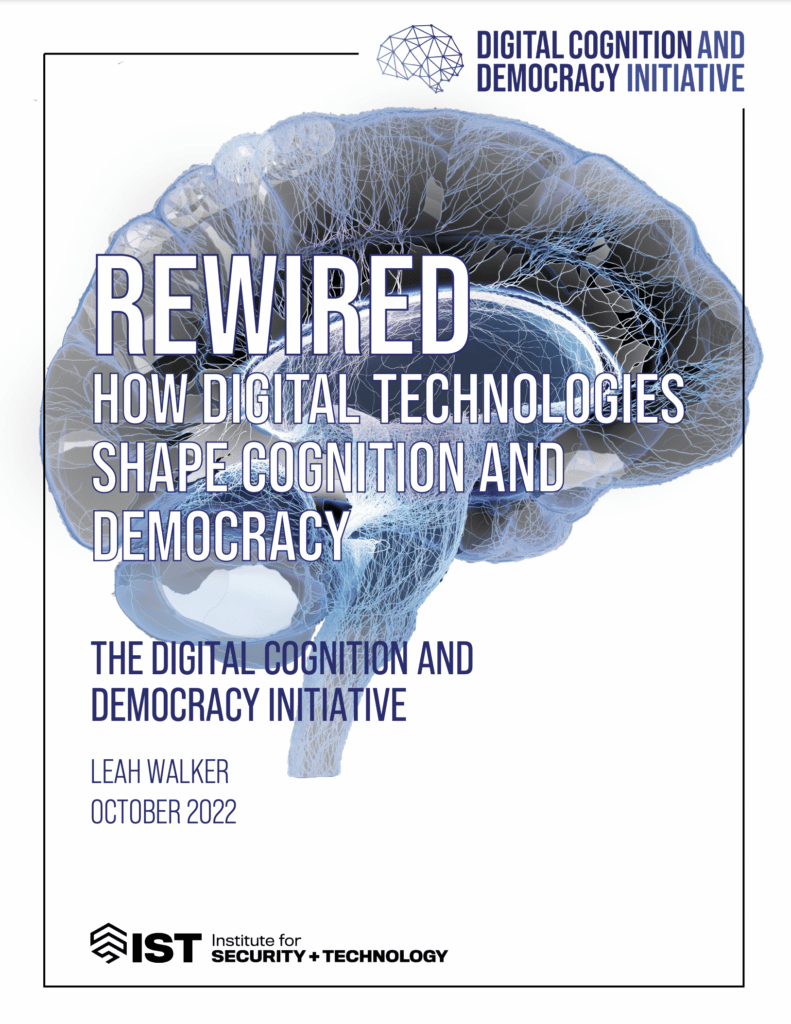Democracy Gone Digital: The Election Season Online
Zoë Brammer, Philip Reiner / Nov 7, 2022Zoë Brammer is the Cyber and Info Operations Senior Analyst and Philip Reiner is the Chief Executive Officer of the Institute for Security and Technology.

With election day around the corner, and the rate of political violence in the U.S. increasing, the urgent challenge that digital tools pose to how we think critically about politics is becoming an emergency. The man who allegedly attacked Speaker of the House Nancy Pelosi’s husband last week – striking him in the head with a hammer after demanding to know Speaker Pelosi’s location – was, in part, radicalized online. As shocking as this crime was, it was only the latest example in a disturbing trend of extremism in the United States being accelerated by digital media. As we discovered in our research on digital cognition, the U.S. desperately needs to help voters grapple with the information overload, emotional manipulation, and shortcuts in reasoning that digital tools provoke.
Unfortunately, we have been slow to recognize the connections between the devices and apps we use for hours every day and our democracy’s ability to function. A frequent response to those highlighting the impact of digital technologies on civil society is that information revolutions have occurred before and democracy has survived. But the revolution we are living through has unprecedented impacts on human communication and behavior.
In our research on digital cognition, we underscore that the speed, scale, and precision of digital tools today surpass earlier information revolutions. In the span of a human lifetime, computers have evolved from glorified calculators to pocket-sized knowledge management hubs that process terabytes of information in milliseconds. In one decade, smartphones went mainstream. We would be naive to believe this transition has not posed profound challenges to human cognition and the subsequent ability of citizens to engage in democracy.
The recent attack on Mr. Pelosi is yet another harbinger of this increasingly pervasive trend, a blinking red light indicating the damage done to democratic engagement by digitally influenced cognition. Pelosi’s attacker is said to have posted memes and conspiracy theories on Facebook about Covid vaccines, the 2020 election, and the January 6, 2021 insurrection.
The current digital ecosystem, where information flows are algorithmically individualized based on stockpiles of behavioral data, makes the distribution of conspiracies more efficient. Algorithms permit purveyors of false claims to target people with powerful, intentionally manipulative messaging. Voters use devices and platforms every day that disrupt their attention, memory, emotions, critical thinking, and reasoning.
Compounding the issues faced by users is the fact that the very makers of these ubiquitous technologies are themselves unable – regardless of whether they are willing – to moderate or even monitor all the information in circulation today. Facebook, for example, has a 193,000:1 user to content moderator ratio. Initial reports indicate that mass layoffs at Twitter reduced its capacity to contend with election misinformation just days before the midterms.
In his November 2 remarks, President Biden acknowledged that our democracy is at risk as a “consequence of lies told for power and profit, lies of conspiracy and malice, lies repeated over and over that generate a cycle of anger, hate, vitriol, and even violence.” These lies flourish in our present digital environment because we have built digital systems to feed off the anger, hate, and vitriol about which Biden speaks.
The result is a massive, murky pool of content that even companies with enormous resources cannot fully comprehend. As our research found, we pay a price for this neglect: the decline of our cognitive faculties as we are forced to try to keep up with the pace of technological evolution, and the resulting blow to the function of democracy.
The good news is that our hands are not tied. In our research, four areas of potential intervention stand out.
First, we need new ways to take charge of our own information environment. The scale of information available via search engines and the slant of stories fed to users on social media has exacerbated increasingly polarized civil discourse.
Second, we need ways to temper the misplaced confidence that access to information gives us. Seamless online knowledge transfers, where we think we know something well but we really just read it online, leads to overconfidence in one's own knowledge. Because we collectively suffer from something called “the illusion of explanatory depth,” each of us believes we have a deeper understanding of issues simply because we have access to information about them – without always being able to evaluate that information for its validity.
Third, we need to understand the relationship between our overconfidence, our biases, and our susceptibility to disinformation. Because we can’t possibly sift through all available information and our ability to evaluate what we see has weakened, our brains, with an algorithmic helping hand, seek confirmation of the beliefs we hold in the issues we think we know so well.
Finally, technology creates a kind of malign convenience, solving our aversion to inconvenient cognitive activities by giving us shortcuts and workarounds for critical thinking, reasoning, and civic debate. Those are the skills we need to evaluate candidates for office and to process the claims of political leaders – and to engage other citizens in the process of choosing those leaders peacefully.
The majority of these threats stem from the overwhelming quantity of information available to us at any given time, and the unnaturally immersive and “easy” experience provided by the digital tools we rely on in our daily lives. These tools aren’t going away. Neither is our susceptibility to them. We need ways to help our brains, and our democracy, counteract their negative effects while we enjoy their benefits.With the midterms upon us, and 2024 candidates preparing to throw their hats in the ring, federal, state, and local election administrators, together with platforms and news outlets, need to help voters grapple with the information overload and the unnaturally immersive experience that digital tools can provoke. But to do that, we need thought leaders, government and citizens to come together to help implement solutions that address these cognitive challenges –– and fast.
Authors


